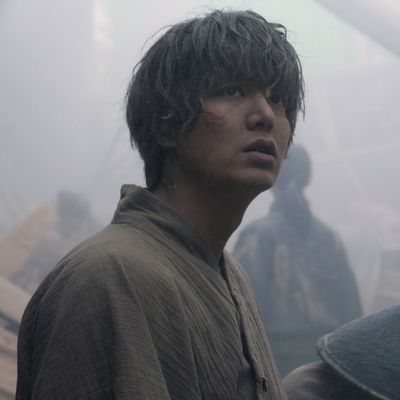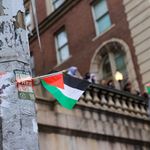
Before we get into the recap, I want to preface this by saying this episode is entirely original in its story. In Min Jin Lee’s novel Pachinko, there’s no overt backstory for Koh Hansu, and frankly, there doesn’t need to be. The story centers on Sunja and all the spiraling relationships that stem outward from her. When I first heard that Apple TV’s Pachinko would be dedicating an episode to Koh Hansu and the 1923 Great Kantō earthquake, I was intrigued but a little skeptical. What could they add that wasn’t in the already rich source material? The answer turns out to be: a whole damn lot. This episode of television shows how adaptations aren’t just two-dimensional translations of text to television but rather fully realized creations on their own.
“Chapter Seven” opens in 1923 Yokohama, where a young Koh Hansu and his father finish a day’s work — Hansu as a tutor, and his father as what looks to be a bookie, or perhaps some accounts manager for a bookie. (I’ve been calling Koh Hansu by his last name ‘Koh’ in other recaps because he seems like the type of character who is spoken most often with honorifics in front of his name. In this episode, because he’s still a young, impressionable man called by his first name, I will be describing him as Hansu.) The two are obviously very close, and when Hansu’s father’s Japanese boss, Ryoichi, invites Hansu to come work for him, Hansu’s father quickly declines. Hansu works as a tutor for a wealthy American family, and while Hansu’s father is proud of his son’s mathematical capability and smarts, he doesn’t want him to follow in his footsteps, working in a shadowy underworld. Ryoichi is disappointed but accepts Hansu’s father’s protestation. As he turns to leave the pair, Ryoichi tells Hansu his Japanese is much improved, but he’ll have to work harder if he wants to be accepted, an idea we’ve heard over and over this season and by now can recognize as a myth.
Away from the international bustle of Yokohama, Hansu works in a gigantic manse that houses the Holmeses, a family of wealthy Americans. He tutors Andrew, a disaffected and whiny young man who thinks math is miserable. Andrew asks his mother if Hansu could be brought along to Yale, where Andrew will go to college in the fall. Without Hansu, Andrew will fail. With that, Andrew’s mother sends Hansu to deliver a message to her husband (a task outside of his job description, but he’s viewed as hired help who will do anything she asks). Hansu brings the message to Mr. Holmes at a private club, who asks how Andrew is doing. Hansu replies that Andrew is trying his best, which Mr. Holmes interprets as his son continuing to be unimpressive.
Mr. Holmes and Andrew are a foil to Hansu and his dad. Mr. Holmes and Andrew have everything that money can buy, but they have no love, respect, or closeness between them. Koh Hansu and his father are struggling financially, but the two adore each other. In the following scene, as Hansu and his father eat outside a baseball stadium, listening to the echoes of a game that they cannot pay to watch up close, their love and respect are palpable. Especially as Hansu’s father makes it clear that he wants his son to go to America and pursue new opportunities, even if it means forsaking their father-son bond; he wants Hansu not to have to work in illegitimate bookkeeping. Hansu’s father tells him he wants him to soar, harkening back to Solomon’s impossible quest to defy gravity.
The following day, Hansu stands outside a room and overhears his father being reprimanded by Ryoichi, his Japanese yakuza boss. It turns out Hansu’s father “borrowed” some money before his pay period to give to a woman, which he promises Ryoichi he will pay back before noon. (Another harkening, this time to Sunja and Kyunghee being confronted by the debt collector in Osaka.) When Hansu berates his father, asking how he could do such a stupid thing, his father says someday Hansu will fall in love and understand. But when the pair goes to the woman’s workplace asking for the money back, she clarifies that she gave it away to the man she actually cared about. Hansu’s father was just a means to an end for her.
On the way to return to Ryoichi, Hansu says he’ll ask Mr. Holmes for the money, but his father refuses. How could Hansu jeopardize his chance to go to America like that? A fight breaks out between the two as Hansu’s father beats him, telling him to kill him in his heart, to forget him and go after a better life. But Hansu refuses to listen to his father and begs Ryoichi to hire him to pay off his father’s debts. His father is horrified, saying he’d rather die than involve his son in his problems, but before Ryoichi can decide what to do, the 1923 Great Kantō earthquake rips through Yokohama. Koh Hansu’s father throws him out of the way of a falling beam and dies.
The screen cuts to black. Sound stops, except for the slight keening left in one’s ear after impact. Koh Hansu and Ryoichi survive the initial quake and go outside, where everyone is covered in soot and dust, the scene rendered in startling black and white. Ryoichi hauls Hansu to higher ground, and when Hansu begins to break down over his dead father, Ryoichi tells him not to waste his father’s sacrifice; he should go and find the Holmeses and accompany them to America.
Hansu races to the Holmes residence, where he finds Mrs. Holmes and Andrew loading up a cart full of their belongings, directing their maids to go in and get more things. Andrew asks Hansu to come with them to America, and Hansu agrees, but he realizes that the Holmeses will never get a cart like this to the port where Mr. Holmes awaits them on an escape boat. The earthquake destroyed the roads; there’s no way they’ll be able to cart their belongings. Instead, Hansu tries to guide them through the chaotic streets on foot, but trying to navigate the swill of people and aftershocks, he loses them in the crowd, coming across Ryoichi instead.
The episode jumps forward in time to 8:48 p.m., showing Yokohama in flames. Ryoichi and Hansu have survived, trudging behind a line of nurses holding lanterns. In the lamplight, Hansu recognizes the corpses of Mrs. Holmes and Andrew lined up on the street. Not only is his employer dead, but so is his short-lived dream of going to America. He bends down and plucks a pocket watch from his body, a watch that viewers will recognize as the watch Hansu later gives Sunja.
Later, Ryoichi and Hansu overhear a group of Japanese people discussing a nearby jailbreak due to the earthquake. The discussion quickly turns fearful when someone says 300 Koreans escaped. Though Ryoichi tells the people to calm down, racist speculation quickly takes hold. Ryoichi and Hansu exit the scene, hurrying to find Ryoichi’s family but on the way encounter a group of four Koreans who cannot understand the directions of a Japanese older man, barking at them to hide in a nearby barn. Hansu steps forward, translating, but it becomes clear that even he ought to hide, that the Japanese people are taking this opportunity to scapegoat their rage and panic by killing Koreans, and so Hansu hides in the older man’s cart.
Soon, a group of Japanese vigilante citizens approaches, asking after the four Koreans. The old Japanese man stonewalls, throwing in some racist epithets about Koreans to distract the crew, lying and saying they went a different way. But the barn fails to escape the vigilantes’ notice, and they set fire to it, burning the four Koreans inside alive. Hansu watches the exchange, horror-stricken, through a slat in the cart.
The episode vaults forward in time again to 2:12 a.m. the following day. On the road, Ryoichi is reunited with his wife and daughters and tells them they’ll be looking after Hansu for a while. After all, he has his father’s debt to pay. It’s a heartbreaking scene that encapsulates the double-edged sword of an oppressor’s so-called generosity. Hansu will be under Ryoichi’s conditional protection. He will never have the legitimate life his father dreamed and sacrificed for. Instead, he will continue working for this Japanese man who believes he is providing some sort of solace when he’s just spit-shining the same shackles.
The episode ends with a shot of young Koh Hansu watching the horizon. His expression is troubled, and he looks to be weeping. One can’t help but wonder what future he sees for himself, among all that he now must mourn.
Pinball Thoughts
• I want to point out that, beyond giving Koh Hansu a backstory, this episode also served to show audiences a glimpse into the long history of anti-Korean sentiment and action in Japan, beyond the annexation of Korea. The massacre of Koreans after the Kantō earthquake predates World War II. By televising and narrativizing this slice of history, the show writers are helping us see just how old and violent the structures of Japanese oppression actually are. Making a point of telling this story, even if briefly, is a political act in an age where right-wing Japanese nationalists continue to push narratives of denialism and erasure, refusing to acknowledge what happened in the past.
• I don’t know what to make of the image of the string of pearls, given by Mrs. Holmes, around Hansu’s neck. It’s visually a strange piece to focus on as he weaves in and out of the panicked crowd of people. I would be interested to know what other viewers thought this signified, if anything. (Speaking of Mrs. Holmes, after watching nearly a full season of TV with almost exclusively Asian characters, it sure was jarring to see a family of white people!!)
• Finally, I wanted to point out the different aspect ratio (the height and width of the image on the screen) in this episode. The new aspect ratio mimics the small-box feel of a film from the 1920s, which is a cool visual flourish, but even more than that, the tight image gives a sense of peeking into something slightly off-limits, like Koh Hansu’s life is something held apart, perhaps tucked away. I really enjoyed this particular cinematographic choice.
• THE SEASON FINALE IS NEXT WEEK, FOLKS!!!




